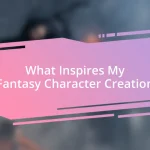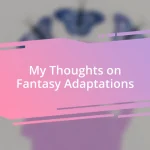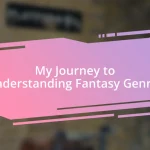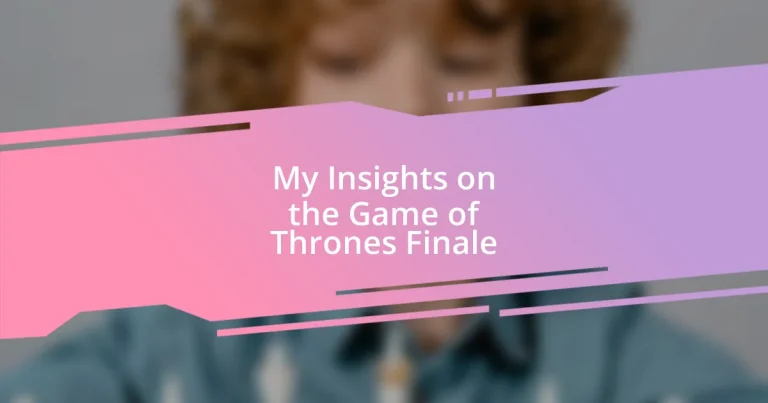Key takeaways:
- Daenerys Targaryen’s transformation from noble to tyrant raises questions about power and values.
- Arya Stark’s realization of the emptiness of vengeance highlights the unforeseen consequences of choices.
- Bran Stark’s ascension to the throne emphasizes the importance of wisdom and humility in leadership over traditional power.

Character Development and Resolutions
Character development in the finale of Game of Thrones stirred strong feelings, especially when I think about Daenerys Targaryen’s tragic transformation. Watching her once noble intentions decay into tyranny was heart-wrenching. It prompts me to wonder: how does power truly define us, and can we ever really stay true to our values in pursuit of it?
Consider Jon Snow, who embodied resilience but ultimately faced a gut-wrenching dilemma. His resolution felt bittersweet to me, as he sacrificed his love for Daenerys to protect the realm. I recall feeling a mix of sadness and respect; it highlights a profound truth—sometimes love isn’t enough, and the greater good can demand the harshest of choices.
Then there’s Sansa Stark, who truly bloomed into a powerful leader. Her journey from a naive girl to the Lady of Winterfell resonated deeply with me. It made me reflect on our own growth; don’t we all have moments where we emerge stronger from our struggles? Sansa’s arc was a testament to resilience and the positive transformations that can arise from adversity.

Visual and Cinematic Techniques
The visual and cinematic techniques used in the Game of Thrones finale contributed significantly to the overall impact of the storytelling. One moment that stands out for me is the stunning cinematography during the Battle of King’s Landing. The interplay of light and shadow created an eerie atmosphere, almost reflecting the moral ambiguity of the characters’ choices. I remember feeling captivated, yet unnerved, watching as flames engulfed the city—each blaze practically telling a story of its own.
- The use of color palettes effectively conveyed emotions; for instance, the vibrant reds contrasted sharply with the desolate greys, emphasizing the chaos.
- Camera angles played a crucial role in showcasing the characters’ emotional states; close-ups captured their inner turmoil.
- Sound design added layers of tension; the haunting score heightened my anticipation during critical moments.
- The careful choreography of battle scenes made the action feel both realistic and impactful, pulling me into the heart of the conflict.
Through these techniques, the finale not only entertained but also made me reflect on the weight of each character’s decisions and the consequences etched throughout their stories.

Lessons Learned from the Finale
The finale of Game of Thrones taught me that choices often come with unforeseen consequences. Watching Arya Stark’s quest for vengeance culminate in a pivotal moment, I felt a pang of sadness as she realized the emptiness of her revenge. It made me think about my own choices in life; sometimes, what we pursue most fervently can lead us down dark paths. I started questioning my driving motivations and whether they align with my values.
Moreover, witnessing Bran Stark’s ascension to the throne presented a poignant lesson about leadership. I found it intriguing how a character often seen as passive ended up being a symbol of breaking the cycle of violence. It left me reflecting on the qualities of a good leader—wisdom and humility can sometimes outweigh traditional notions of power. Can we learn to lead with understanding rather than brute force? I believe that striving for a more compassionate leadership style could greatly benefit not just our communities but ourselves.
Lastly, the finale emphasized the unpredictability of fate. Characters we’ve grown to love faced sudden and heartbreaking ends. This made me recall my own experiences with loss and the importance of cherishing those around us. It’s a reminder that life can change in an instant, urging us to value our connections in ways we might not always consider.
| Lesson | Personal Reflection |
|---|---|
| Consequences of Choices | Sometimes the pursuit of vengeance can leave us empty and lost. |
| Qualities of Good Leadership | Wisdom and humility can often triumph over traditional power. |
| Impermanence of Life | Embracing every moment encourages deeper connections and gratitude. |

Final Thoughts and Future Implications
The finale of Game of Thrones left me with a whirlwind of emotions and reflections on how narratives can shape cultural discussions. It’s interesting to ponder how the choices made by characters mirror the complexities in our own lives—how often do we find ourselves grappling with decisions that seem right at the moment but eventually lead to unforeseen consequences? This connection between fiction and reality reminds me of my own experiences where decisions have led me down unexpected paths, often forcing me to reassess my motivations and values.
Looking ahead, I believe the dialogue sparked by the finale will significantly influence future storytelling in television and film. As viewers, we seem to crave more nuanced narratives that dive deeper into the gray areas of morality. I wonder if showrunners will take this as a cue to craft characters that resonate with our real-life struggles and triumphs, encouraging us to explore our own complexities through the lens of their stories. I would love to see more content that pushes these boundaries, engaging us on a level that feels both personal and universal.
Lastly, the finale serves as a potent reminder of the impact stories can have on our perspectives. How might we shift our understanding of success and power by reflecting on the lessons we learned from Westeros? In a world that often glorifies triumphs that stem from violence or manipulation, I find myself advocating for narratives that emphasize connection, empathy, and understanding. Personally, I have felt a change in how I approach conversations around leadership and ethical dilemmas, and I hope others may do the same, inspired by the question: what kind of legacy do we want to create, both in our stories and our lives?














